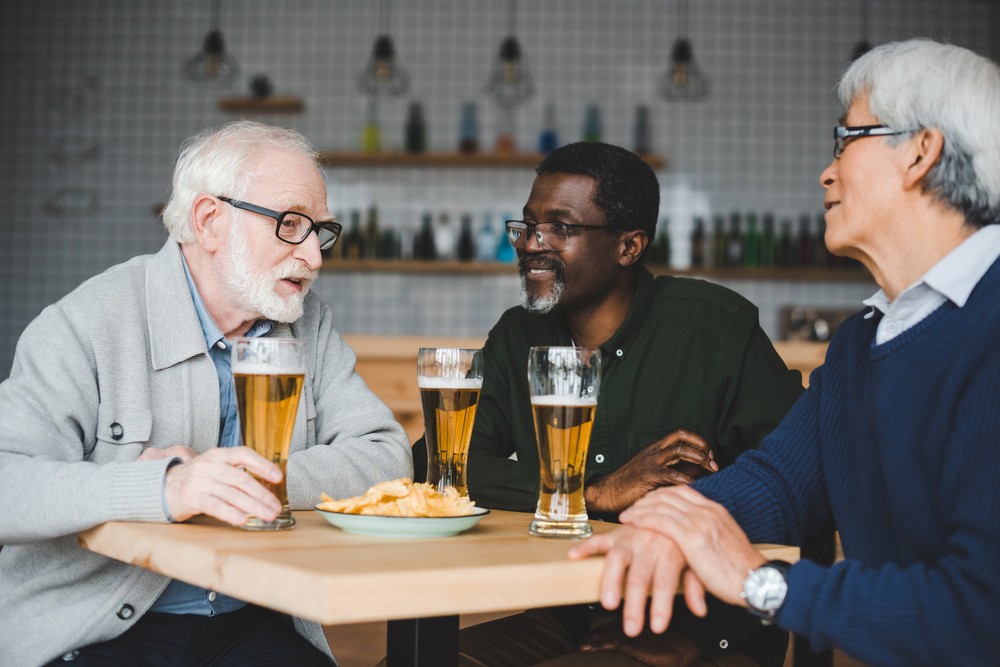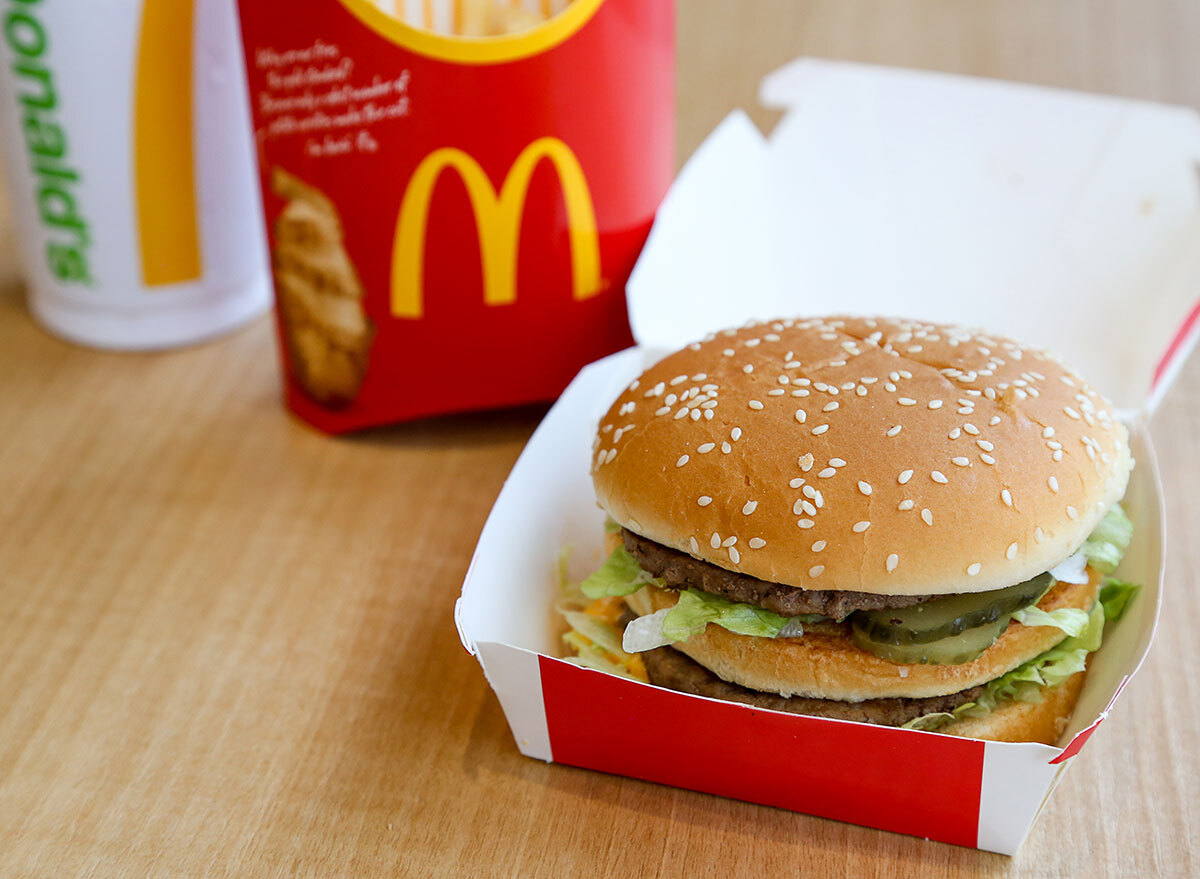Ang pag-inom tulad nito pagkatapos ng 40 ay maaaring isang maagang pag-sign ng demensya, sabi ng pag-aaral
Ang mga eksperto ay nagpapahiwatig ng pangangailangan upang mas maunawaan ang koneksyon sa pagitan ng pag-inom at demensya.

Many of us worry about dementia as we get older. During early stages, symptoms of dementia may be something as small as forgetfulness or getting lost in familiar places, the World Health Organization (WHO) says, but in later stages, symptoms can be heartbreaking. People with this condition can become fully dependent on caregivers and may have even difficulty recognizing friends and family. Previous research has confirmed that lifelong alcohol abuse is one of the risk factors for dementia, but for those who start drinking heavily later in life, there could be a different association. Read on to learn more about how certain drinking habits after 40 could actually be a warning sign for this condition.
Kaugnay:This Common Medication Could Be Hurting Your Brain, New Study Says.
Researchers found that people who start abusing alcohol later in life may already have dementia.

Starting to abuse alcohol after age 40 might be the first sign of a neurological condition like dementia, researchers from the Icahn School of Medicine at Mount Sinai and the University of California, San Francisco found. The study, published in the April 4 edition of the Journal of Alzheimer's Disease, was conducted to address lingering questions about late-onset alcohol abuse and whether it could signal neurodegenerative diseases patients already have. When looking at patients with different forms of dementia, investigators concluded that this kind of excessive drinking could actually be a "presenting symptom"—in other words, the reason a patient seeks out medical treatment—of dementia.
Late-onset alcohol abuse was more frequent in patients with frontotemporal dementia.

Researchers included participants with different forms of dementia, including behavioral variant frontotemporal dementia, Alzheimer's-type dementia, and aphasia. According to the paper's senior author,Georges Naasan, MD, associate professor of neurology and medical director for the Division of Behavioral Neurology and Neuropsychiatry at the Ichan School of Medicine, investigators identified and compared lifelong alcohol abuse (starting before the age of 40), late-onset alcohol abuse (starting at age 40 or above), as well as alcohol abuse as the first symptom of dementia (abuse that started within the first three years from symptom onset).AE0FCC31AE342FD3A1346EBB1F342FCB.
"What we found is that alcohol abuse may be the first sign of an underlying neurological condition when it presents late in life," Naasan said in a press release from Mount Sinai, pointing to frontotemporal dementia specifically. "In fact, up to seven percent (nearly one in 15) of patients with frontotemporal dementia started abusing alcohol late in life, and five percent (one in 20) did so as the first symptom of the disease."
Late-onset alcohol abuse was less frequent in people with Alzheimer's disease. All in all, investigators found that just over two percent of patients with dementia were likely to start abusing alcohol after age 40.
Kaugnay:For more up-to-date information, sign up for our daily newsletter.
People who have dementia could be misdiagnosed with primary alcohol abuse.

People who need help for alcohol abuse later in life generally seek out a psychiatrist, their primary care provider, or a rehabilitation specialist—not a neurologist. This creates a dangerous problem, as patients could be misdiagnosed with primary alcohol abuse, the Mount Sinai press release states. When patients are referred to undergo a treatment program for addiction unnecessarily, they may wait even longer for a correct diagnosis.
According to Naasan, to avoid this, healthcare providers need to be aware that different brain diseases could be the cause of this alcohol abuse, specifically for patients who don't have a history of heavy drinking.
"While it is important to identify social factors that may lead to alcohol abuse, such as retirement, loneliness, or loss of income/loved ones/housing, our data should implore health care workers to avoid systematically attributing alcohol abuse to these aspects and prompt clinicians to investigate the possibility of frontal lobe dysfunction," Naasan said, adding that healthcare providers should check for frontal lobe symptoms and refer any at-risk patients to a neurologist.
Do I need to be concerned about my drinking habits?

Bago ka manumpa ng alak magpakailanman, magkaroon ng kamalayan na ang isang baso ng alak na may hapunan o isang serbesa na may mga kaibigan ay hindi kinakailangang mapunta sa kategoryang "late-onset alcohol abuse". Ayon sa Bundok Sinai press release, ang pangkalahatang pag-abuso sa alak ay tinukoy bilang "kapag ang pag-inom ng alkohol ay negatibong nakakaapekto sa trabaho o buhay sa lipunan o humahantong sa mga legal na paggalang."
Ayon sa mga sentro para sa kontrol at proteksyon ng sakit (CDC),Labis na pag-inom Maaaring ilagay sa panganib ang iyong kalusugan kapwa sa panandaliang, sa pamamagitan ng pagkalason ng alkohol, pati na rin sa pangmatagalan, na may mas mataas na panganib ng kanser, sakit sa puso, at demensya. Ang pag-inom ng binge, ang pinakakaraniwang paraan ng labis na pag-inom, ay tinukoy bilang pag-ubos ng apat o higit pang mga inumin sa isang pagkakataon para sa mga kababaihan, at lima para sa mga lalaki, habang ang mabigat na pag-inom ay higit sa walong inumin para sa mga kababaihan bawat linggo, at 15 inumin para sa mga lalaki.
Kaugnay:Ang pagkain ng popular na pagkain ay maaaring humantong sa demensya, sabi ng pag-aaral.

binigyan ang kanyang geneticism ng isang pagkakataon: Si Anna Borodina ay nakakagulat sa kanyang batang hitsura

15 mga problema sa kalusugan upang ma-check out kaagad, sabihin eksperto
